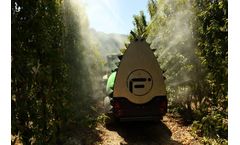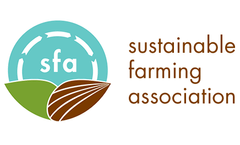Reduce Pesticide Use Articles & Analysis
24 news found
Berger (Head of Technology, Fede) is part of the focus group specialized in methods of reducing the use of pesticides in pome and stone fruit production, which has published the paper “Precision Agriculture – An enabler for pesticides use reduction”. ...
From the legendary Hanging Gardens of Babylon, built in the 6th century BCE during the reign of Nebuchadnezzar II (circa 605-562 BCE), to contemporary vertical farming, humanity has always sought creative solutions to cultivate greenery in limited spaces. The Hanging Gardens, a symbol of visionary engineering and an early intuition of harmony between humans and nature, celebrated beauty and ...
Traditional farming methods are often inefficient in water use, leading to significant waste and depletion of freshwater resources. ...
As farmers around the world increasingly adopt agricultural drones, governments and regulators are beginning to recognize the many benefits of this technology. By reducing the use of pesticides and delivering growth with a significantly lower carbon footprint, drones empower farmers to become climate smart. ...
Four trends are driving this growth, says Mark Trimmer, DunhamTrimmer managing partner: Consumer demand for reducing pesticide use, especially in produce. Favorable policies in the U.S., European Union and other countries. ...
SprayBot will investigate how combining early disease detection techniques such as imaging and spore sensors with robotic machinery can create a system to improve the application of fungicides and biopesticides, with the aim of reducing overall pesticide use. Richard Glass, Sector Lead at CHAP said: “Plant protection products remain an ...
Now, I can’t remember the last time I needed to squeegee anything off the windshield, let alone fight about it. Habitat loss, pesticide use, pathogens and introduced species, and climate change are the main causes of decline. ...
Not only do bats reduce crop damage by eating adult corn earworm crop pests, they also suppress fungal infections in maize ears. ...
To reduce use of high risk pesticides, the Strategy’s “Objectives” include: Requiring agricultural application of such highest-risk pesticides to be "justified by an agronomist in advance of 100% of cases"; Tripling of the number of pesticides that are banned in urban environments for ...
Results of new University of Florida Institute of Food and Agricultural Sciences research may help control some dangerous species of fungi, known as phytophthora — or water molds — that can cause millions of dollars in damage annually to ornamental plants and some fruit trees. This finding could help reduce fungicide use to control the phytophthora ...
The use of pesticides in orchards may be threatening populations of wild bees, which are important pollinators that increase crop productivity, a new study concludes. ...
Integrated Pest Management (IPM) is a sustainable approach to reduce pesticide use and risks of adverse effects on human health and the environment. ...
GMO crops have, by and large, proved to be a boon for farmers and have improved the environment by reducing insecticide applications and encouraging no-till farming which benefits the soil and cuts carbon emissions. [2] The problem with this technology is not that it has been scaled up too fast, but that it has been hampered from being able to fulfil its potential — whole ...
Encouraging insect pollination could therefore reduce the destruction of natural ecosystems to make way for soybean cultivation, the researchers say. ...
EPA recently awarded an agricultural grant for $131,758 to the University of Vermont for a project to develop and promote Integrated Pest Management (IPM) practices to reduce the use of potentially harmful pesticides and lower risk to bees all while controlling pests and saving money. Specifically, the UVM project is designed to ...
Environmental Protection Agency (EPA) announced that Penn State University would be one of three recipients of agricultural grants for Integrated Pest Management (IPM) practices to reduce the use of potentially harmful pesticides and lower risk to bees all while controlling pests and saving money. ...
Environmental Protection Agency (EPA) announced agricultural grants for Integrated Pest Management (IPM) practices to reduce the use of potentially harmful pesticides and lower risk to bees all while controlling pests and saving money. ...
The salmon was grown in a land-based closed containment aquaculture facility in West Virginia, using cutting edge technology. The advantage, says Bill Taylor, President of ASF, is that closed containment aquaculture eliminates the interaction of farmed salmon and the environment. “With the added sustainability factors for land-based operations, including virtually 100 % ...
This includes information about how to reduce chemicals and train farmers on how to reduce pesticides and use pheromone traps to reduce insects. ...
Geological Survey study. The declines in pesticide concentrations closely followed declines in their annual applications, indicating that reducing pesticide use is an effective and reliable strategy for reducing pesticide contamination in streams. ...













